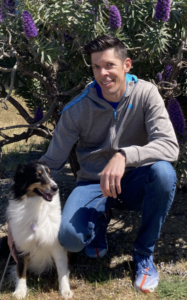I have always had an innate feeling that I wanted to be a parent. Maybe it was from helping my younger sister when I a child myself, or just my personality. Regardless of the ‘nature vs nurture’ reasoning, it has been omnipresent. It didn’t matter who I was with or where I was, I was going to make it happen, no matter the obstacles.
The LGBTQ community is presented with a lot of obstacles when it comes to family building, and being in that wonderful community has thrown its share at me. In my first serious relationship, my ex told me he also wanted children. We invested significant time into the relationship, including going through the adoption process while living in Washington, D.C. I nervously waited for a phone call from our agency with a match.
Amid a move and updating adoption paperwork, my husband admitted that he wasn’t ready for kids and couldn’t provide an answer for when he would be. This admission, among myriad other things, led to our eventual divorce after ten years together.
I was intent on having children; it was always a deal-breaker for me. I uprooted and relocated to San Francisco two years after our breakup in search of a better work-life balance. Being a Secret Service Agent was not kind to one’s home life and that, too, would be left behind in search of a family.
While floating in the middle of the ocean on an Atlantis cruise,
Two years later, we attended a Men Having Babies conference and began planning our journey. We had friends who pursued surrogacy and we found it to be a viable option. We enlisted the help of a surrogacy agency and a renowned fertility clinic. We were told it usually costs around $150,000, success rates were 85% +, and we’d have a bouncing baby in one to two years. Everything was painted as rosy and beautiful, with no mention of what became our reality.
We found an egg donor and a month later we had two viable PGT-tested embryos, as each step of the process had a 50% reduction rate. Given the advertised success rates, this didn’t bother me. Our surrogacy agency presented us with a surrogate a few weeks later, and we quickly matched with her. It seemed we were off to the races and would have our first child in 2022.
That is not what happened.
After legal clearance and a medical procedure, we had our first embryo transfer. The next ten days were nerve-racking as we waited on the presumed positive pregnancy test, based on the hype we had been sold. It was an emotional crash when the results were negative. My mind allowed me to envision our child, our new life, and the long-delayed exuberance during those ten days. I broke down and cried when we got the results as my mind sought to reconcile reality. Nobody had prepared us for this moment or outcome.
After another medical procedure, we had our second embryo transfer. We were told that the success rate was in the 90s for subsequent transfers. Our hopes were high but more grounded after the prior failure.
The blood test came back positive and we nervously waited for the results of a second blood test— to show the HCG levels were doubling, reflective of a true pregnancy— which also returned positive, but the numbers weren’t very high, so a third test was ordered. Doubt had set in that this, too, would be a failure and our child to be, may not be at all.
The results showed declining numbers and we knew the embryo transfer didn’t stick.
During those weeks, as much as we tried to keep our minds from thinking about it, we visualized what it’d be like having daughters. That amplified the letdown, leading me to shed more tears and assess if this was something I could keep doing.
We were then hit with another realization: I was out of embryos. After much debate, we sought an egg donor to create new embryos. It would also eliminate one of the variables—the egg donor— in the two failures. Another $60,000 investment and we had an abundance of new embryos.
Our next curveball came in the spring of 2023 when we discovered that our surrogate had dropped her surrogate-friendly health insurance (that we were paying for) the prior August and had been pocketing the money since.
Our agency quickly rematched us with a different surrogate who was bubbly, thoughtful, and considerate. We received a much better vibe from her than the prior surrogate, and are forever grateful to have her in our lives. Our fertility clinic was empathetic to our situation, providing valuable assistance when we needed it most.
Due to the timeline shift, we had already enlisted the help of another surrogacy agency for our second child and matched with a surrogate relatively quickly. We had a failed embryo transfer with that surrogate, but it was easier to handle mentally since we were well-versed in the process by then. We originally planned to have our children one year apart, but that isn’t how life works. We adapt and move forward, even with two surrogates.
We remained optimistic that things would eventually work out, but it got difficult when we saw and heard other couples who had success on the first embryo transfer, who had no surrogate drama, and spent significantly less, or ended up with healthy twins from one surrogacy journey.
We were in the minority regarding the obstacles we faced, and we were genuinely happy for our friends who had much easier paths, but I can’t deny that it was in the back of my mind. Knowing we could handle the rougher journey gave me solace.
We weren’t eligible for financial assistance, and funded all aspects of the surrogacy and IVF costs out of pocket, eclipsing the average cost of a home in America. We are fortunate that we have since been able to meet those demands, but when our straight peers are eligible for family planning benefits and we aren’t— it’s another glaring example of the difficulties that our community faces.
Despite working for the largest employer in America and my fiancé working for the largest healthcare provider in California, we are not eligible for benefits based on the definition of infertility. We, two men, are not infertile and therefore denied any benefits despite paying the same insurance premiums.
At a time when the LGBTQ community is under constant attack from Republicans and conservative states, this adds to the uncertainty, anxiety, and discriminatory practices. For example, we turned down a surrogate who lived in Arkansas due to the state’s policies toward our community.
At any time, a state can decide that two persons of the same-sex cannot be listed on a birth certificate. A court could rule against us during parentage proceedings. The state may outlaw abortions when it is medically necessary for the health of the surrogate and fetus. The obstetrician can refuse our presence since we aren’t the “patient.” A hospital can banish us when the baby is born, might not recognize us as the parents, and might refuse to relinquish custody of our child.
Attorneys advise that we should also adopt our children, in case laws change. This becomes important for the parent who isn’t biologically related to the child.
Regardless of the barriers, we find a way forward. It is what we do for the things we want most and, in my case, been the most elusive. I had always envisioned being a parent long before hitting my 40s, but life works in weird ways.
Enduring this journey will make parenthood that much sweeter for us, with a greater appreciation for each day and the little moments within them, that build lasting memories. At an earlier age, I wouldn’t have had the tools or resources to deal with these curveballs, and I hadn’t met my human, who makes me a better person and who will make a phenomenal father. That, in turn, will make me a better daddy to these long-awaited children.
 Cory Allen grew up in rural western Pennsylvania before a divorce moved the family to a conservative suburb of Richmond, Virginia. He ended up in the U.S. Air Force, which led to a career in local law enforcement. In 2019 at the pinnacle of his career, he left the Secret Service and everything he knew on the east coast to restart his life in California and begin the process of finally being his own person. Cory continues to work in law enforcement, now leading the next generation of Special Agents, and he resides in California with his partner, where they are plotting their way into parenthood.
Cory Allen grew up in rural western Pennsylvania before a divorce moved the family to a conservative suburb of Richmond, Virginia. He ended up in the U.S. Air Force, which led to a career in local law enforcement. In 2019 at the pinnacle of his career, he left the Secret Service and everything he knew on the east coast to restart his life in California and begin the process of finally being his own person. Cory continues to work in law enforcement, now leading the next generation of Special Agents, and he resides in California with his partner, where they are plotting their way into parenthood.





